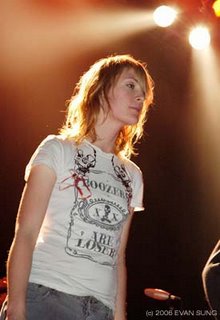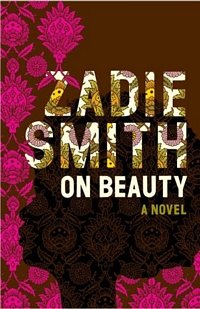 I've paid almost no attention to the microgenre called Dubstep. Whenever I saw the word, I immediately turned the page, clicked away, turned off. I'm not at all sure why. Something to do with it seeming to be such a theorist's genre.
I've paid almost no attention to the microgenre called Dubstep. Whenever I saw the word, I immediately turned the page, clicked away, turned off. I'm not at all sure why. Something to do with it seeming to be such a theorist's genre.
Well, that's my loss. Burial's self-titled debut album is a thing of twilit wonder, crepuscular and grainy, Ghost Town purged of all pop. I've heard mention made of Tricky's Maxinquaye, and while Burial sounds nothing at all like that album (I listened to it for the first times in ages the other day. I'd forgotten how humid, how florid it sounds), there is a similar sui generis feel, that this record is something new. On the other hand, it could be that an album this hermetically sealed will make for a very poor antecdent: We'll see.
Buy Burial from Amazon
Tuesday, October 17, 2006
Burial - Burial
Emily Haines & The Soft Skeleton : Knives Don't Have Your Back
 Emily Haines is a Broken Social Scene-ster, and the daughter of a noted jazz poet (I learn). Her debut album, four years in the making, is an absolute joy, although that word has a positivity that's out of place when discussing Knives; it's pretty crushingly bleak in places.
Emily Haines is a Broken Social Scene-ster, and the daughter of a noted jazz poet (I learn). Her debut album, four years in the making, is an absolute joy, although that word has a positivity that's out of place when discussing Knives; it's pretty crushingly bleak in places.
The song that really struck is the first single, Dr Blind.
If the dizzying highs
Don't subside
overnight
Dr Blind
Just prescribe
The red ones
The song is built around a kind of monumental piano (similar to Massive Attack's False Flags) and has the funereal pace of Radiohead's Exit Music, and something of that song's tightly enfolded structure and atmospheres - distant guitars, tugging strings, feedback.
Crowd Surf Off A Cliff has a repeated refrain of "I wake up lonely", followed by "Rather give the world away/Than wake up lonely". But the naked emotionalism of the album nevers seems un-earned, and that's partly because her voice is beautifully plain, allowing the lyrics to do the work, and partly because there's an atmosphere of defeated menace to the best songs ('With all the luck you've had/Why are your songs so sad?').
Which is all very annoying because it seems I should be listening to Joanna Newsom's Ys, if the feverish chatter across the interweb is anything to go by. Next time.
Tuesday, October 03, 2006
Two books
 I ought to mention three books I read recently; three doozies.
I ought to mention three books I read recently; three doozies.
First up was Zadie Smith's On Beauty. Now, I had had no inclination to read this whatsover. Since aggressively not reading the exceptionally popular White Teeth (how could a book that popular be any good? Come on. See also: Billy Elliott, A Beautiful Mind), I was happily convinced that I never needed to read another word of Zadie (Zadie. What's that about? etc) And when James Wood took apart The Autograph Man in The LRB (see "Fundamentally Goyish", I thought: Zadie and me? We're finished.
Consequently, none of On Beauty's good notices penetrated my carapace of lazy prejudice. So what changed my mind? A combination of things. One thing was a perspicacious interview with Ian McEwan in the Believer Book of Writers Talking To Writers. She quizzed Ian about his then-new book Saturday and pointed out that the book made a self-conscious effort to discuss the real world of work. That may sound dull as dirt, but since most celebrated authors wouldn't know one end of an office from another, it's actually something of a rarity and quite an achievement (yes, yes: I know Perowne is actually a brain surgeon, but it sure makes a change from novel's featuring poets, painters, writers, academics). But she also pointed out that McEwan wants to eat his cake and have it too; there's a long description of cutting open the skull which is a also a lightly disguised metaphor for the craft of writing (I think the surgeon evens uses a pen or brush).
Another factor was Zadie's chat with John Mullan in the Guardian book club about On Beauty. She came across as humble, massively critical of her work to date, a reformed advocate of Theory ("I read essays I wrote as an undergraduate, and they're literally incomprehensible") and an acute observer of culture, with no particular axes to grind.
And so, one day, there I was, realising that I wanted to read the book. You gotta love the unconscious.
The book? It's great, actually. Using Howards End as a template or scaffold, it tells the story of a white English academic (Smith admitted that McEwan's ability to write about work was quite beyond her) in America and his black American middle-class family, the wife struggling in her mostly white social circle, the youngest son a hip-hop devotee convinced he's not black enough, the daughter a classic do-gooder trying to convince a rapper his work is poetry (he's the Leonard Bast figure) and pulling all sorts of strings to get him into her poety class. The book is hilarious and moving, her way with dialogue often breaktaking. My only criticism is that perhaps the book doesn't get under the skin of its characters to anything like the same degree as, say, The Line Of Beauty: she's not as harsh on them. Still, a great read (if not a great book). The second book is Ali Smith's The Accidental. I knew literally nothing about this book or its author, except a vague memory of the cover of 'Hotel World' (and the fact that she had brilliantly titled her short story collection "Other Stories And Other Stories"). The book is about a disintegrating family holidaying somewhere in darkest Norfolk: The wife is trying to write the latest in her series of hugely popular historial narratives, the husband (an academic!) is, you guessed it, having an affair or affairs with various students, the son, outlandishly nerdish and guilty as hell, is contemplating suicide, and the youngest daughter is besotted with her new digital camera and the new ways of looking at her world it affords her. Into their lives comes a drifter, claiming her car has broken down, and would they mind if she stays?
The second book is Ali Smith's The Accidental. I knew literally nothing about this book or its author, except a vague memory of the cover of 'Hotel World' (and the fact that she had brilliantly titled her short story collection "Other Stories And Other Stories"). The book is about a disintegrating family holidaying somewhere in darkest Norfolk: The wife is trying to write the latest in her series of hugely popular historial narratives, the husband (an academic!) is, you guessed it, having an affair or affairs with various students, the son, outlandishly nerdish and guilty as hell, is contemplating suicide, and the youngest daughter is besotted with her new digital camera and the new ways of looking at her world it affords her. Into their lives comes a drifter, claiming her car has broken down, and would they mind if she stays?
What makes the book so rich is that the tale is told from each person's POV completely successfully. The philandering academic's section deteriorates (or elevates), under the pressure of his infatuation with the intruder, into a delirious sonnet sequence. The wife interogates herself in the style of her popular books. And the children are captured brilliantly, the son in the style of a precocious mathematician who's been very very bad, the daughter a wide-eyed innocent trying to understand the world.
It's an old-fashioned book in its unswerving commitment to modernism and formal tricksyness, but for all that, in fact thanks to that, it's never less that compulsively readable. In fact, the only better novel this year is the one I read next: James Meek's The People's Act Of Love.
Sentences
Reading Lolita (finally...), I came across the following sentence which I think is worth sharing:
"My heart beat like a drum as she sat down, cool skirt ballooning, subsiding, on the sofa next to me, and played with her glossy fruit. She tossed it up into the sun-dusted air, and caught it-it made a cupped polished plop"Love that ravishing 'sun-dusted'. I suspect I'm going to be saying that quite a bit. Although I probably won't say it's a quote from a fictional pederast...



